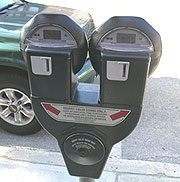 Iowa’s capital city is installing some new technology so commuters no longer have to search for the right number of quarters and dimes to plug the parking meter.
Iowa’s capital city is installing some new technology so commuters no longer have to search for the right number of quarters and dimes to plug the parking meter.
Mike Berry of the Des Moines Traffic and Transportation Office says they’re installing devices on some one-thousnd parking meters that let drivers pay with a “smart card.”
Berry says the smart card is a little plastic card with a chip in it that holds value and you insert the card into the meter and pay up to the time limit on the parking meter. The high-tech meters also give you credit for time not used.
He says when you come back and you still have time left on the meter, you stick the card back into the meter and the value is placed back on the card. The city has set up stations where you can buy the card and purchase more meter time. Berry says the cards take the guesswork out of plugging the meter and only require you to pay for the time you use.
Berry says people often go someplace and put in enough money for an hour and get delayed and come back and find a parking ticket for an expired meter on their windshield. He says the card allows you to put in the maximum time and if you get delayed you don’t get back and find “a little present” under your windshield wiper.
Berry says the devices that read the cards don’t add much more expense to the parking meters. He says it’s an add-on cost to the existing meters of between 24 and 38 dollars, and a new meter is only 12 dollars more than an existing meter. Berry believes Des Moines is the first Iowa city to use this type of system. He says Minneapolis uses the system and gave it a good recommendation.
Berry says Minneapolis has had no problems with it and likes it. He does say the system works best for certain groups, such as people who do deliveries or park all day.
Berry says it’s not something people who make an occasional visit to downtown would probably be interested in. But all the meters still take coins for those who don’t have a smart card. Berry says 700 of the new meters have been put in thus far and they hope to have the rest in place by mid-December.
